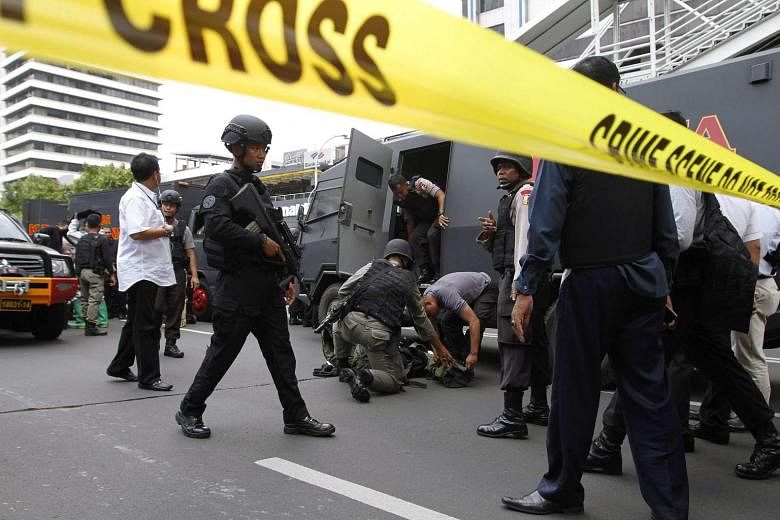Jakarta's police chief said on Thursday that militant group Islamic State in Iraq and Syria (ISIS) was definitely behind the attacks in the Indonesian capital.
Mr Tito Karnavian told reporters that Indonesian ISIS fighter Bahrun Naim was "planning this for awhile". His comments came as a news agency allied to the militant group claimed that ISIS was responsible.
Analysts say the level of coordination required for the multiple attacks on Thursday clearly indicates that ISIS is behind the assault.
"The ISIS network in Indonesia mounted the attack," said terrorism expert Rohan Gunaratna in an e-mail interview with The Straits Times.
He added that although the Indonesian police last month successfully foiled a terrorist bombing and arrested nine individuals with alleged links to ISIS, the scale of threat is too high for the government capabilities deployed to fight it. Dr Gunaratna is professor of security studies at the S. Rajaratnam School of International Studies, Nanyang Technological University.
In a blog posting entitled 'Lessons from the Paris Attacks' (Pelajaran dari Serangan Paris) days after the Nov 13 attacks last year, alleged mastermind Bahrun Naim urged his Indonesian audience to study the planning, targeting, timing, coordination, security and courage of the Paris attackers.
He is among the hundreds of Indonesians who went to the Middle East to join ISIS and from there attempted to organise an attack in Central Java last August.
He once served two and a half years in an Indonesian jail for storing 533 assault rifle bullets and 32 revolver bullets.
Dr Kumar Ramakrishna, head of policy studies at the S. Rajaratnam School of International Studies, said: "The apparent multiple gunmen acting in synchronicity and the possible use of suicide vests - this is hard to pin down at the moment - suggests an ISIS signature, as this signature was certainly there in Paris on Nov 13. This is speculative at this point of course."
CNN security analyst Bob Baer said the Jakarta attacks bear the signature of ISIS. It "sounds like the Paris attack to me," he was quoted as saying on the news channel.
Terrorism and security analyst Judith Jacob, however, said that it is too early to say what ISIS' level of involvement, if any, is at this point.
"ISIS-inspired groups are operating in Indonesia but there are more non-ISIS affiliated Salafi-jihadist groups with long standing networks as well," she told The Straits Times in an e-mail interview.
In an assessment of Indonesia's terror risks last November following the Paris attacks, Dr Sidney Jones, Director of the Institute for Policy Analysis of Conflict, warned that there could be a change in tactics on the part of pro-ISIS groups in Indonesia, including a decision to target foreigners.
Hours after the Jakarta blasts, the pro-ISIS Aamaaq news agency said on its Telegram channel that ISIS fighters carried out "an armed attack targeting foreign nationals and the security forces charged with protecting them in the Indonesian capital".
On Thursday, militants targeted Jakarta's bustling Thamrin Street, home to many luxury hotels, embassies and offices.
Writing in a post on The Interpreter blog last November, Dr Jones said, "there is as yet no ISIS structure for Indonesia, and that pressure from some pro-ISIS quarters to form a unified organisation has not yet succeeded".
Thursday's blasts were the first major attack in Jakarta since the twin bombings of the JW Marriott and Ritz-Carlton hotels in 2009. Seven people were killed and dozens seriously injured. Terrorists linked to the Al-Qaeda offshoot Jamaah Islamiyah (JI) were responsible for the hotel attacks.
JI was also responsible for the Bali bombings that killed 202 people in 2002.
According to Ms Jacob, the combination of bombs and gun-fire exchanges with the police in Thursday's attack is unusual for attacks in Indonesia.
"In the past, militants have relied on either small arms in shootouts with security forces or improvised explosive devices (IEDs). The level of coordination is also significant as there appear to have been multiple attackers at several locations, rather than a single target," she said.
This suggests an increase in the level of the operational and coordination skills of the assailants, at least when compared to the levels witnessed in the early 2000s.
Political analyst Yohanes Sulaiman told New York Times that while the Indonesian police had "done a good job in preventing such attacks", the government has not been able to stop the radicalism.
Funds from ISIS are said to have found their way to militants operating out of provinces such as Central Sulawesi, where Santoso, the country's most wanted terrorist, is believed to be based.
Additional reporting from Lim Yan Liang


